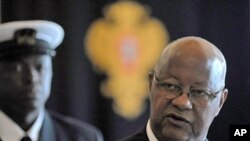Regional diplomats say the army's brief arrest of Guinea-Bissau's prime minister reinforces the need for security sector reform in a country with a long history of military intervention in civilian politics.
Prime Minister Carlos Gomes Jr. was only under house arrest for a few hours Thursday, but the move against him has re-ignited concerns about the army's role in Guinea-Bissau's political life.
When soldiers returned the prime minister to his office, they were met by angry pro-democracy supporters waving palm leaves and chanting "Down With Dictatorship."
Prime Minister Gomes came to power following elections last July that chose Malam Bacai Sanha to succeed President Joao Bernardo Vieira. President Vieira was assassinated by mutinous soldiers hours after his main political rival, General Batista Tagme Na Waie, died in a bomb blast.
The prime minister's arrest was led by Deputy Chief of Army Staff Antonio Indjai, who is a relative of the late General Tagme and commands a battalion that is thought to have been involved in President Vieira's murder.
Indjai says he moved against the prime minister Thursday because he is responsible for the deaths of people in an earlier coup attempt that Mr. Gomes says he had nothing to do with. But Indjai says this was an isolated incident not directed against the broader civilian government or Mr. Sanha who he says is a great president.
President Sanha campaigned on the need to reform Guinea-Bissau's military which still contains many of those who fought for independence from Portuguese colonialism 36 years ago and now refuse to retire because a small military pension would leave them in poverty.
"How do you right-size, I would not say down-size, right-size the armed forces to give an opportunity to the former freedom fighters who are not literate and try to give them an opportunity to retire and give them training to give them the opportunity to come into civilian life with an expertise and a pension fund," said Mahamane Toure, Commissioner for Political Affairs at the Economic Community of West African States.
Toure says President Sanha is raising the value of that pension fund and is looking for contributions from partners including ECOWAS and the European Union. "They need to have a restructuring of the armed forces to give them some professionalism and give them the opportunity to intervene in peace operations, to revamp some of the camps and try to give a real livelihood to the military and give them a purpose to be a republican armed forces," he said.
Joseph Mutaboba, the UN Secretary General's Special Representative in Bissau, says recurring military intervention in politics is the result of constantly changing alliances. He says everyone in Guinea-Bissau wants to be the boss. Everyone wants to be a minister. Everyone wants to be an ambassador. Everyone wants to be something. Everyone wants to become what they can never become. He says there is too much demand and not enough vacancies in such a small country.
President Sanha's government has set as its target having an army of about 4,000 soldiers. That is less than half the current number of men under arms and will require substantial outside financial assistance to retire veterans who enjoy considerable political influence.
PM's Arrest Reinforces Need for Security Reform in Guinea-Bissau




